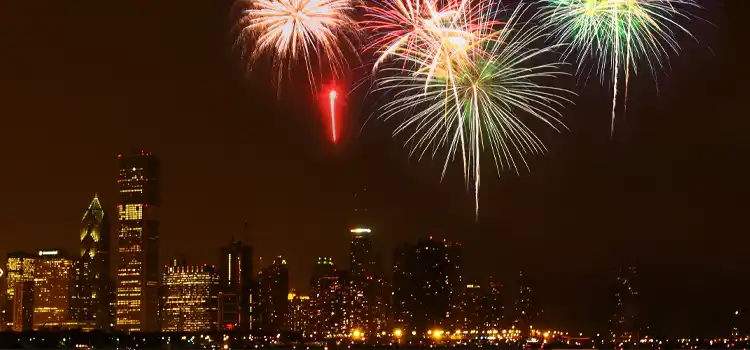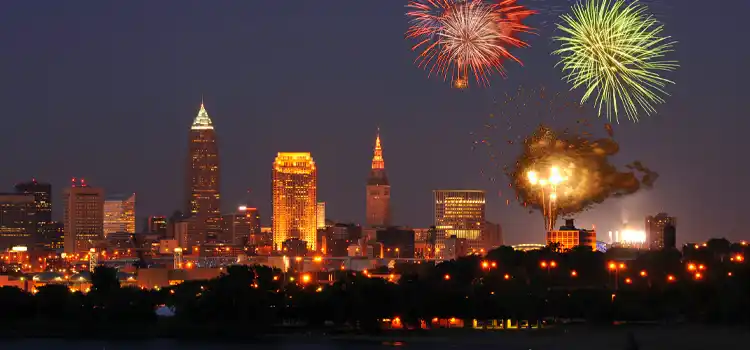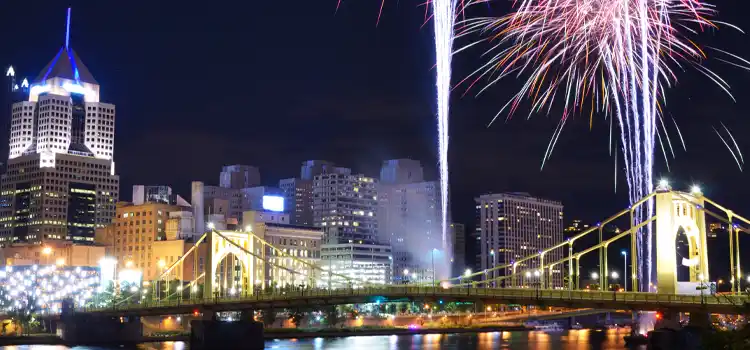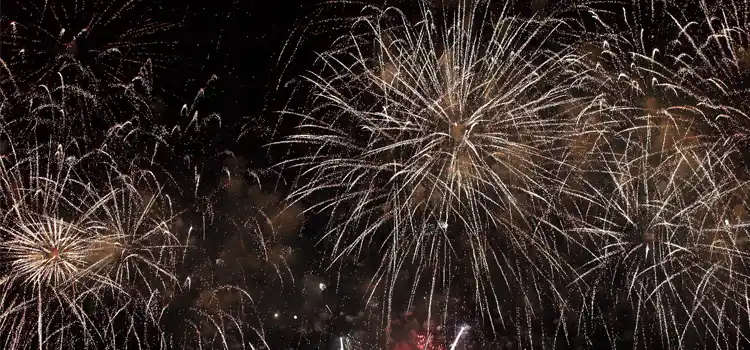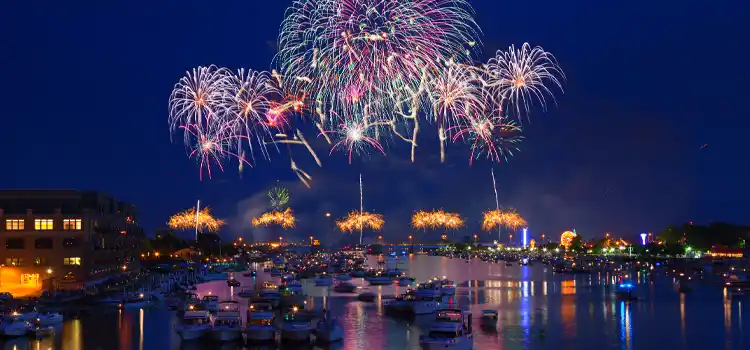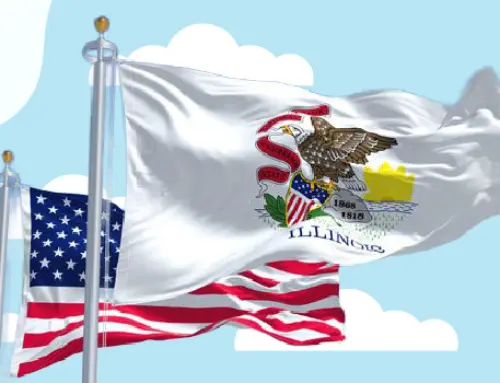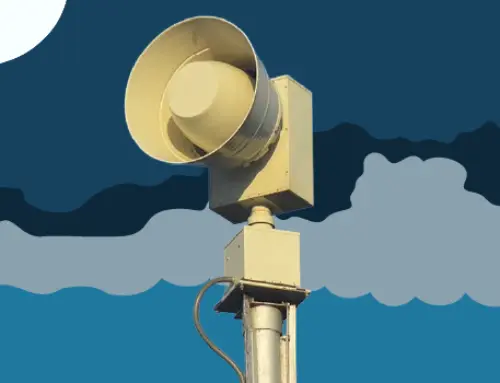Are Fireworks Legal in the Midwest? IL, OH, PA & Beyond
by Jenna Mendez
25.9 min read

Every summer and new year, Midwestern skies light up with dazzling fireworks displays. But while the celebrations are a tradition, the laws behind them are anything but uniform.
If you're wondering whether fireworks are legal in your Midwestern state, you're not alone. Fireworks laws vary widely across the region, from full-out bans to loosely regulated consumer sales. This blog will help you understand what's legal, what's not, and how to celebrate safely and responsibly in the Midwest.
Key Points of This Article:
-
Illinois has some of the strictest fireworks laws. Most fireworks are illegal, with only small novelty items like sparklers, party poppers, smoke devices, and snakes allowed.
-
Fireworks are legal in Ohio, Pennsylvania, Indiana, and Michigan, but each state has specific rules, restrictions, and timing requirements.
-
Wisconsin requires a permit for most fireworks that explode or launch into the air, including firecrackers, bottle rockets, Roman candles, and mortars.
-
Fireworks are not eco-friendly. They release pollutants and fine particles into the air, which can affect air quality, health, and the environment.
Why Do Some States Ban Certain Fireworks?
Some U.S. states and municipalities have placed bans or restrictions on specific types of fireworks—and not without reason. These measures are primarily driven by concerns over public safety, environmental impact, and community well-being. Let’s take a closer look at why some states ban certain fireworks:
1. Public Safety Concerns
Fireworks, while festive, are inherently hazardous. They can cause serious injuries, including burns, lacerations, and even fatalities. Fireworks-related injuries occur annually, many involving children and bystanders. Improper handling, malfunctioning devices, and lack of safety precautions contribute to these incidents. In response, some states have banned or limited the use of certain fireworks to mitigate these risks.
2. Fire Hazards and Wildfire Risks
In regions prone to dry conditions and wildfires, fireworks pose a significant fire hazard. Sparks from fireworks can easily ignite dry vegetation, leading to devastating wildfires. Because of this, several states prone to drought or wildfire outbreaks have taken a cautious approach, restricting or banning fireworks during high-risk periods or altogether.
3. Environmental and Health Impacts
Fireworks release pollutants, including particulate matter and toxic chemicals, into the air and water. These substances can degrade air quality and pose health risks, particularly for individuals with respiratory conditions. Fireworks displays can lead to sharp increases in air pollution levels, with potential consequences for both human health and the environment.
4. Noise Pollution and Community Disturbance
The loud explosions associated with fireworks can be distressing to many, including veterans with PTSD, individuals with sensory sensitivities, and pets. The noise can cause anxiety, sleep disturbances, and other health issues. To address these concerns, some communities have implemented bans or restrictions on noisy fireworks, opting instead for quieter alternatives like drone or laser light shows.
Are Fireworks Legal in Illinois?
If you’re wondering if fireworks are legal in Illinois, the short answer is no. You can’t use fireworks in this state as it has one of the strictest laws in the country. The only items allowed aren’t even considered real fireworks—things like sparklers or smoke bombs—and even those can be banned by your local city or town.
Under the Illinois Pyrotechnic Use Act (PUA), it’s illegal to sell, own, or use any consumer firework—meaning all the common ones you might find in other states, like firecrackers, bottle rockets, or Roman candles. If you’re caught breaking the law, you could face up to one year in jail and a $2,500 fine. So, it’s definitely not worth the risk.
One big reason fireworks aren’t legal in Illinois is safety, especially when it comes to kids. Even something that seems harmless, like a sparkler, can be really dangerous. Sparklers actually cause the most firework-related injuries each year, and young children are often the ones getting hurt.
Most people don’t realize this, but sparklers burn at over 1,200 degrees —that’s hot enough to melt some metals and make steel glow red. Just a quick touch can cause a serious burn, and in some cases, it can leave permanent scars or long-term damage. That’s why Illinois takes a strict stance on fireworks—even the small ones.
What Fireworks Are Allowed in Illinois?
While Illinois bans most consumer fireworks, a few novelty items are permitted under state law. These are generally low-risk and non-explosive:
Sparklers: These are handheld sticks that emit colorful sparks when lit and are commonly used during celebrations.
Some small-cap guns: These toy guns use tiny caps to make a safe popping sound when triggered, which is why they are allowed in Illinois.
Snake or glow worm pellets: These are small tablets that, when ignited, produce slow-burning ash that looks like a growing snake.
Smoke devices: Smoke devices are items that release colored or white smoke for visual effects and are typically used during the daytime.
Trick noisemakers (party poppers): These are small devices that release confetti and a soft popping noise when pulled.
Snappers: Snappers are paper-wrapped items that make a cracking sound when thrown against a hard surface.
Trick matches: These are matches that spark or crackle as a novelty effect.
These items are considered novelties rather than actual fireworks and are still subject to local restrictions, so always check with your city or county before using them.
Are Fireworks Legal in Illinois on the 4th of July?
In Illinois, state officials really stress that fireworks should be left to the pros, especially during the Fourth of July. Both the Illinois Department of Natural Resources (IDNR) and the State Fire Marshal’s Office want people to know that fireworks can be extremely dangerous if used by anyone who isn’t trained. We’re talking about serious injuries like burns, amputations, or even accidental deaths.
If you’re part of a group hosting a fireworks show, the state requires that your fireworks provider is properly licensed. That means they must have a special explosives license and storage certificate from the IDNR and the Office of the State Fire Marshal. Without those, the show is illegal.
Here’s what else is important to know: under the Illinois Explosives Act, anyone handling or storing display-grade fireworks—like the ones used in big shows—must be licensed. And handheld fireworks like firecrackers, Roman candles, and bottle rockets? They’re not approved at all for sale or use in Illinois because of safety concerns.
If someone is caught with display fireworks and doesn’t have the proper licenses, they could face serious legal trouble—we’re talking up to five years in prison and a $10,000 fine. Plus, IDNR can hand out extra administrative fines on top of that.
So, the bottom line? Celebrate safely and let licensed professionals handle the fireworks.
Are Fireworks Legal in Ohio?
Yes, fireworks are legal in Ohio, but with some important rules. Since July 1, 2022, people in Ohio are allowed to set off 1.4G consumer fireworks (the kind you’d find at most fireworks stands) on specific days throughout the year unless your city or town has decided to ban them. So, it’s always a good idea to check your local laws before lighting anything.
That said, 1.3G display fireworks—the really big ones used in professional shows—are still off-limits to the public. You can’t buy or use them unless you’re licensed.
If you’re using fireworks in Ohio, you have to do it on your own property or somewhere that the owner has clearly given you permission. Also, only adults 18 and older can handle or light fireworks. And there’s a required safety zone: spectators must stay at least 150 feet away from aerial fireworks like Roman candles or bottle rockets and at least 50 feet away from non-aerial fireworks like fountains or firecrackers.
Another big rule: no using fireworks while under the influence of alcohol or drugs. If someone does, they could be charged with a first-degree misdemeanor, which is a serious offense.
So yes, you can enjoy fireworks in Ohio—but only if you follow the rules and put safety first.
What Days Are Fireworks Legal in Ohio?
In Ohio, you can legally set off fireworks on more than just the Fourth of July. The state law gives residents several approved holidays to celebrate with fireworks. Specifically, you’re allowed to light them on July 3, 4, and 5, as well as the Fridays, Saturdays, and Sundays before and after Independence Day.
But that’s not all—Ohio also lets you enjoy fireworks on other special occasions throughout the year, including:
- New Year’s Eve & New Year’s Day
- Memorial Day weekend
- Labor Day weekend
- Cinco de Mayo
- Juneteenth
- Diwali
- Chinese New Year
There are also time restrictions: on most days, you can light fireworks from 4 p.m. to 11 p.m. On New Year’s Eve, the window extends to 11:59 p.m., and on New Year’s Day, you’re allowed to set them off from 12 a.m. to 1 a.m. and again from 4 p.m. to 11 p.m.
So, if you’re planning to celebrate with fireworks, just make sure you’re doing it on the right day and within the legal hours!
Are Fireworks Legal in Pennsylvania?
In Pennsylvania, regular people can legally buy and use “consumer-grade” fireworks—these are items like firecrackers, Roman candles, and bottle rockets. They contain a small amount of explosive material (up to 50 milligrams) and are the kind you’ll typically find at roadside fireworks stands.
The bigger, more powerful fireworks—known as “display fireworks”—are only for professionals with a permit from the city or town where the show is happening. These include large aerial shells and loud salutes with more explosive material than what’s allowed for consumer use.
When Can You Use Fireworks in PA?
In Pennsylvania, residents are generally allowed to use fireworks between 10 a.m. and 10 p.m., but extended hours are permitted around certain holidays.
On New Year’s Eve, fireworks can be used until 1 a.m. on New Year’s Day. For Fourth of July celebrations, usage is allowed until 1 a.m. on July 2, 3, and 4. If the Fourth falls on a weekday—specifically Tuesday, Wednesday, or Thursday—those extended hours also apply to the Friday and Saturday before and after the holiday.
However, it’s important to note that local municipalities have the authority to set stricter rules, including limiting or completely banning fireworks. So before you light anything, it’s always a good idea to check with your local government for specific regulations in your area.
Penalties for Breaking Pennsylvania Firework Laws
Violating Pennsylvania’s fireworks laws can come with serious consequences. If you’re caught using consumer fireworks illegally, a first offense could result in a fine of up to $500, while a second offense within three years could raise the fine to $1,000. Those caught selling fireworks without a license face even steeper penalties—a first offense is considered a misdemeanor and can carry a fine of up to $10,000. A second offense within three years could increase the fine to $15,000 and may result in the loss of your business license.
The consequences escalate further for anyone using or selling display-grade fireworks without a permit, which is classified as a felony and can lead to fines ranging from $10,000 to $15,000, depending on whether it’s a repeat offense. Selling federally banned explosives, such as M-80s or cherry bombs, is also a felony, punishable by fines up to $15,000 and potential criminal charges. The bottom line is that the legal and financial risks of violating fireworks laws are far too great to ignore.
How Old Do You Need To Be To Buy Fireworks in PA?
To buy consumer fireworks, you have to be at least 18 years old, and they must be bought from a licensed, permanent store approved by the Department of Agriculture. Even if you order them online or by mail, you still have to pick them up from one of these licensed locations. Consumer fireworks do not include “ground and handheld sparkling devices,” “novelties,” and “toy caps,” which are permitted at all times throughout the Commonwealth.
Are Fireworks Legal in Indiana?
Yes, fireworks are legal in Indiana—but not all types, and there are rules you’ll need to follow. Indiana does allow consumer fireworks like sparklers, firecrackers, and other novelty items, but there are restrictions based on age, time, and location.
You must be 18 or older to legally purchase fireworks, and they can only be set off between 9 a.m. and 11 p.m. on most days, depending on where you live. On holidays like the Fourth of July and New Year’s Eve, usage is extended until midnight.
Fireworks may only be used on your own property, on someone else’s property with permission, or at a location approved by the State Fire Marshal. It’s also important to check with your local government, as towns and cities in Indiana can set additional rules or restrictions.
The state also bans more dangerous devices like cherry bombs, M-80s, and similar explosive items. If you’re caught breaking the law, penalties can be serious—ranging from misdemeanors to felonies, depending on the situation.
Lastly, Indiana classifies fireworks into two main categories: consumer fireworks and display fireworks. Consumer fireworks, labeled as 1.4G, are the smaller items you’ll typically find in retail stores across the state—such as sparklers, fountains, and firecrackers. These are legal for personal use, provided you follow the state’s guidelines. On the other hand, display fireworks, classified as 1.3G, are the large, professional-grade devices often used in public shows. These are not legal for personal use unless you have special state and federal permits to purchase, store, and launch them.
So yes, you can enjoy fireworks in Indiana—just make sure you’re using the right kind, at the right time, in the right place.
Are Fireworks Legal in Michigan?
Yes, fireworks are legal in Michigan for personal use, but there are some important rules to keep in mind.
Michigan allows the sale and use of consumer fireworks (classified as 1.4G), which include popular items like bottle rockets, Roman candles, and anything that launches into the air. However, local cities and towns can create their own rules about when you can use them—so always check with your local government first.
Michigan also recognizes different categories of fireworks. Novelty items such as sparklers, snaps, poppers, and snakes are always legal and aren’t regulated under the state’s primary fireworks law. Low-impact fireworks, like ground-based sparklers or handheld fountains, are permitted for use but require sellers to register with the state. Display fireworks (1.3G)—the large-scale types used in public shows—are only allowed for use by licensed professionals with local permits and are not legal for personal use.
In terms of rules, buyers must be 18 years or older to purchase consumer fireworks. Fireworks cannot be used while under the influence of alcohol or drugs, and you may not set them off on public property, school grounds, or private property without permission.
If you’re a retailer, you’ll need a fireworks certificate to sell consumer-grade fireworks, which is valid from the issue date through April 30 of the following year. However, you don’t need a certificate to sell simple novelty items.
Are Fireworks Legal in Wisconsin?
In Wisconsin, most fireworks that explode or shoot into the air—like firecrackers, bottle rockets, Roman candles, and mortars—are illegal unless you have a permit from your local mayor or town board. This includes both using and possessing them.
If you don’t have a permit and get caught with illegal fireworks, you could be fined $1,000 per item. So, for example, if you’re found with 20 illegal fireworks, you could face a $20,000 fine.
However, some low-risk items are allowed without a permit. These include sparklers (up to 36 inches long), stationary cones and fountains, toy snakes, smoke bombs, and small novelty items like caps, noisemakers, and confetti poppers, as long as they contain less than ¼ grain of explosive material.
These items are considered novelties, not fireworks, under state law, and there’s no age restriction for buying or using them. However, local towns and cities can still make their own rules, so it’s a good idea to check with your community before using even these.
If it goes up in the air or blows up, you probably need a permit. If it just sits on the ground and sparkles, it’s likely okay without one.
So yes, you can enjoy a little sparkle in Wisconsin—but anything big or loud? You’ll need to get the right permit first.
Full List of U.S. States Where Some Fireworks Are Legal
As of 2025, 49 states plus Washington, D.C. permit the use of certain types of consumer fireworks to varying degrees. Massachusetts remains the only state with a complete ban on all consumer fireworks.
States Permitting Most Consumer Fireworks
These states generally allow the sale and use of a wide range of consumer fireworks, including aerial and explosive types, with some regulations:
- Alabama: Permits most consumer fireworks; local restrictions may apply.
- Alaska: Allows consumer fireworks; usage may be limited by local ordinances.
- Arkansas: Permits sale and use of consumer fireworks; certain dates may be restricted.
- Florida: Legalized most consumer fireworks in 2020; usage restricted to specific holidays.
- Georgia: Allows consumer fireworks; prohibited between midnight and 10 a.m.
- Indiana: Permits all consumer fireworks; usage times regulated.
- Iowa: Legalized consumer fireworks in 2017; local governments can impose restrictions.
- Kansas: Allows most consumer fireworks; sales and usage periods are regulated.
- Kentucky: Permits sale and use of consumer fireworks; age restrictions apply.
- Louisiana: Allows consumer fireworks; local ordinances may limit usage.
- Maine: Permits consumer fireworks; some municipalities have bans.
- Michigan: Legalized consumer fireworks in 2011; local governments can regulate usage times.
- Mississippi: Allows most consumer fireworks; local restrictions may be in place.
- Missouri: Permits sale and use of consumer fireworks; specific dates apply.
- Montana: Allows consumer fireworks; usage may be restricted during fire season.
- Nebraska: Permits most consumer fireworks; sales and usage dates are regulated.
- New Hampshire: Allows consumer fireworks; local ordinances may impose restrictions.
- New Mexico: Permits consumer fireworks; local governments can enact bans.
- North Dakota: Allows sale and use of consumer fireworks; specific dates apply.
- Ohio: Legalized consumer fireworks in 2022; usage permitted on certain holidays.
- Oklahoma: Permits most consumer fireworks; sales and usage periods are regulated.
- Pennsylvania: Allows consumer fireworks; usage restricted near buildings and vehicles.
- South Carolina: Permits sale and use of consumer fireworks; local restrictions may apply.
- South Dakota: Allows most consumer fireworks; usage dates are regulated.
- Tennessee: Permits consumer fireworks; local governments can impose restrictions.
- Texas: Allows sale and use of consumer fireworks; specific dates apply.
- Utah: Permits consumer fireworks; usage restricted to certain holidays.
- Washington: Allows consumer fireworks; local ordinances may impose bans.
- West Virginia: Permits sale and use of consumer fireworks; age restrictions apply.
- Wyoming: Allows consumer fireworks; regulations vary by county.
States Allowing Only Non-Aerial and Non-Explosive Fireworks
These states permit “safe and sane” fireworks, such as sparklers and fountains, but prohibit aerial and explosive types:
- Arizona: Allows ground-based fireworks; aerials are banned.
- California: Permits “safe and sane” fireworks; local bans are common due to fire risks.
- Colorado: Allows non-aerial fireworks; aerials are prohibited.
- Connecticut: Permits sparklers and fountains; aerials are banned.
- Delaware: Allows sparklers and ground-based items on July 4 and December 31.
- Idaho: Permits non-aerial fireworks; aerials are restricted.
- Maryland: Allows ground-based fireworks; aerials are banned.
- Minnesota: Permits sparklers and fountains; aerials are prohibited.
- New Jersey: Allows sparklers and fountains; aerials are banned.
- New York: Permits sparklers and fountains in certain counties; aerials are prohibited.
- North Carolina: Allows sparklers and fountains; aerials are banned.
- Oregon: Permits non-aerial fireworks; aerials are prohibited.
- Rhode Island: Allows ground-based fireworks; aerials are banned.
- Virginia: Permits sparklers and fountains; aerials are prohibited.
- Wisconsin: Allows sparklers and fountains; aerials require a permit.
- Washington, D.C.: Permits sparklers and fountains; aerials are banned.
States with County-Level Regulations
In these states, fireworks laws are determined at the county level, leading to varying regulations within the state:
- Hawaii: Fireworks regulations vary by county; permits often required.
- Nevada: Laws differ by county; some allow “safe and sane” fireworks, others have bans.
- Wyoming: Regulations are set by counties; some permit all consumer fireworks, others have restrictions.
How to Protect Yourself from Fireworks
We know you’re excited to celebrate—but before you light that fuse, let’s go over a few simple ways to keep yourself safe:
- Only Use Legal Fireworks: Make sure the fireworks you’re using are legal in your state. Illegal or homemade fireworks, like M-80s or cherry bombs, are highly unpredictable and dangerous. Always read and follow the safety labels on the packaging.
- Never Relight a Dud: If a firework doesn’t ignite, don’t try to relight it. Wait at least 20 minutes, then soak it in water before safely discarding it. Trying to relight a dud is one of the top causes of firework injuries.
- Keep a Safe Distance: Once a firework is lit, move away quickly to a safe distance. Spectators should stay at least 35 feet away from ground-based fireworks and 150 feet away from aerial fireworks, according to safety recommendations.
- Wear Eye and Hand Protection: Safety glasses can help protect your eyes from sparks or debris. And while fireworks aren’t typically held in the hand, wearing protective gloves can reduce injury in case of accidental contact.
- Avoid Alcohol When Handling Fireworks: Fireworks and alcohol don’t mix. If you’re lighting fireworks, stay sober to ensure proper handling and judgment. Always designate a “sober shooter” for the night.
- Keep Water Nearby: Always have a bucket of water or a hose within reach in case of a fire or emergency. After use, soak used fireworks in water before throwing them in the trash.
- Light One at a Time: Only light one firework at a time, and never attempt to combine or modify fireworks. Mishandling or altering fireworks significantly increases the risk of injury or explosion.
- Supervise Children Closely: Never let young children handle fireworks—even sparklers, which can burn at over 1,200°F. Older kids should only use fireworks under close adult supervision.
- Light Fireworks Outdoors in a Clear Area: Use fireworks in open, outdoor spaces away from homes, dry grass, trees, and vehicles. Avoid lighting fireworks near flammable materials or overhead structures like power lines.
How to Protect Your Pets from Fireworks
While you’re enjoying the show, the noise and flashing lights can be terrifying for your pets. Let’s go over a few easy ways to keep your furry friends calm, safe, and comforted from fireworks:
- Create a Safe Haven Indoors: Designate a quiet, comfortable space in your home where your pet can feel secure. This could be an interior room with minimal windows to reduce noise and light exposure. Adding familiar items like their bed, toys, and a piece of your clothing can provide additional comfort. Playing soft music or white noise can also help mask the sounds of fireworks.
- Exercise Before the Event: Engage your pet in physical activity earlier in the day. A well-exercised pet is more likely to rest during the evening festivities, reducing anxiety levels.
- Use Calming Aids: Consider using anxiety-reducing products such as pressure wraps or calming collars. These can provide a sense of security for your pet. For pets with severe anxiety, consult your veterinarian about possible medications or treatments.
- Keep Pets Indoors: Ensure your pets are kept indoors during fireworks displays. Even pets that are typically comfortable outside can become frightened and attempt to escape when exposed to loud noises.
- Update Identification: Make sure your pet’s identification tags and microchip information are current. In the event they do escape, this will increase the chances of a safe return.
- Avoid Bringing Pets to Fireworks Displays: It’s best to leave pets at home during fireworks events. The unfamiliar environment, crowds, and loud noises can be overwhelming and increase the risk of your pet becoming lost or injured.
- Consult Your Veterinarian: If your pet has a history of severe anxiety during fireworks, speak with your veterinarian ahead of time. They can provide guidance on behavior modification techniques or prescribe appropriate medications to help manage your pet’s stress.
Alternatives to Traditional Fireworks
If you’re not a fan of loud booms or the cleanup that follows, here are some creative ways to celebrate without the bang:
- Glow Sticks and LED Accessories: Glow sticks are a vibrant and safe alternative to sparklers. They come in various colors and can last for several hours, making them perfect for nighttime celebrations. Additionally, LED accessories like foam sticks and bracelets can enhance the visual experience.
- Silly String: Silly String offers a playful way to celebrate. It’s especially popular among children and can be used for games and decorations. However, it’s essential to use it responsibly and clean up afterward to avoid environmental impact.
- Laser Light Shows: Laser light projectors can create stunning visual displays synchronized to music. They are reusable and can be set up in various settings, providing a mesmerizing experience without the noise and debris of fireworks.
- Drone Light Shows: Drone shows have emerged as a high-tech alternative to fireworks. They can create intricate patterns and animations in the sky, offering a silent and environmentally friendly spectacle.
- Bubbles and Confetti Poppers: Bubbles are a delightful and safe option, especially for young children. Glow-in-the-dark bubbles add an extra layer of fun for evening events. Confetti poppers can provide the excitement of a “pop” without the dangers of fireworks.
- Attending Professional Displays: If you prefer traditional fireworks, consider attending professional displays organized by local authorities. These events are conducted with safety measures in place and can be a safer alternative to setting off fireworks at home.
Are Fireworks Earth-Friendly?
While fireworks are a staple of many celebrations, their environmental footprint is significant and multifaceted. Fireworks are not very eco-friendly.
Fireworks release a cocktail of pollutants into the atmosphere, including fine particulate matter. These substances can degrade air quality, posing health risks to humans and animals alike. A study from NYU Langone Health found that air pollution near a major Fourth of July fireworks show spiked sharply, with harmful particles reaching up to 3,000 micrograms per cubic meter—and over 1,000 at nearby sites—shortly after the event.
The remnants of fireworks don’t just vanish; they settle onto land and water bodies, introducing harmful chemicals into ecosystems. Perchlorates, commonly used as oxidizers in fireworks, are highly soluble and can infiltrate groundwater and surface water, disrupting aquatic life and contaminating drinking water sources.
Similarly, the loud explosions and bright flashes of fireworks can be terrifying for wildlife. New research has found that fireworks cause significant disturbances to bird communities, with many birds fleeing their habitats—even from areas more than six miles away from the source—during displays.
Despite all this, there are eco-friendly fireworks available that burn more biodegradable materials like cardboard. However, they do still emit some sort of chemicals in the air, but much less than their less eco-friendly counterparts.
More Eco-Friendly Alternatives to Fireworks
In light of these concerns, many communities and individuals are exploring sustainable alternatives to traditional fireworks:
Drone Light Shows: These displays utilize synchronized drones equipped with LED lights to create stunning aerial displays, all without the smoke, noise, or debris associated with traditional fireworks.
Laser Light Displays: These lights offer vibrant, customizable visuals that can be safely enjoyed at large events without any environmental pollution.
Silent Fireworks: These are specially designed to reduce noise, making them a more considerate option for pets, wildlife, and people with sensory sensitivities.
Biodegradable Confetti and Glow Sticks: Biodegradable confetti and glow sticks provide a fun and festive atmosphere without leaving behind harmful waste or polluting the environment.
What Are Non-Aerial and Non-Explosive Fireworks?
Non-aerial and non-explosive fireworks—often referred to as “safe and sane” fireworks—are designed to provide visual and auditory effects without launching into the air or producing loud explosions. These types of fireworks are generally considered safer for consumer use and are permitted in several U.S. states, including Illinois, Michigan, and Wisconsin.
These fireworks are ground-based, meaning they remain stationary during use and avoid the risks of erratic flight paths. They lack explosive bursts, so you won’t hear the booming sounds typical of aerial fireworks. Instead, they deliver milder visual and auditory effects, such as colorful sparks, smoke, and soft crackling sounds.
Common examples include sparklers, which emit bright sparks; fountains, which shoot shimmering effects upwards in a fixed pattern; and smoke devices, which release colored smoke often used during the day. Other popular options are snaps and poppers, which make a quick popping sound when thrown, and ground spinners, which twirl in place while producing colorful effects. While safer, these items still require care and supervision, especially around children.
Are Non-Aerial and Non-Explosive Fireworks Harmful to Our Health?
While non-aerial and non-explosive fireworks—often labeled as “safe and sane”—are generally considered less hazardous than their aerial counterparts, they are not without health risks. These fireworks, including sparklers, fountains, and smoke devices, can still pose significant dangers to both physical well-being and air quality.
Sparklers, a popular non-aerial firework, can burn at temperatures exceeding 2,000°F, hot enough to melt some metals. This extreme heat can cause severe burns, particularly in children, who are often the primary users of these devices.
Similarly, the combustion of fireworks, including non-aerial types, releases fine particulate matter (PM2.5) into the air. These microscopic particles can penetrate deep into the lungs, exacerbating respiratory conditions like asthma and bronchitis and increasing the risk of heart disease. Individuals with pre-existing health conditions, children, and the elderly are particularly vulnerable to these pollutants.
Fireworks often contain heavy metals and other toxic substances to produce vibrant colors and effects. For instance, barium compounds are used for green colors, strontium for red, and copper for blue. Inhaling the smoke from these fireworks can introduce these harmful chemicals into the body, potentially leading to neurological and developmental issues, especially with prolonged exposure.
Fireworks are a beloved part of many celebrations across the Midwest—but it’s essential to understand that laws vary widely from state to state, and even town to town. Whether you’re planning a backyard show or simply watching from the sidelines, knowing what’s legal, what’s not, and how to stay safe is key to enjoying the festivities without unintended consequences.
As you gear up for your next celebration, do your part to protect yourself, your neighbors, and your community. Stay safe, stay smart, and let the joy—not the danger—light up the night.
At Santanna Energy Services, we’re proud to power homes across the Midwest—especially during the moments that bring us together. From backyard BBQs to festive fireworks, we’re here to help you celebrate safely and sustainably.
Looking to keep the good times rolling all season long? Explore our energy plans designed with Midwest families in mind. See your options here for your ideal Santanna energy plan today.
Jenna Mendez is a Midwest native with lifelong roots in Illinois and time spent in Ohio during college, giving her a deep understanding of the Midwest region’s people, climate, and energy needs. She brings firsthand experience and local insight to topics that matter to Midwest homeowners, especially energy efficiency, sustainability, and home living. Jenna specializes in writing about eco-friendly living, all things Midwest, renewable energy, and practical ways to reduce energy costs. Jenna brings a trusted, and local hometown voice to every article she writes, helping readers live well, and sustainably, right where they are.


